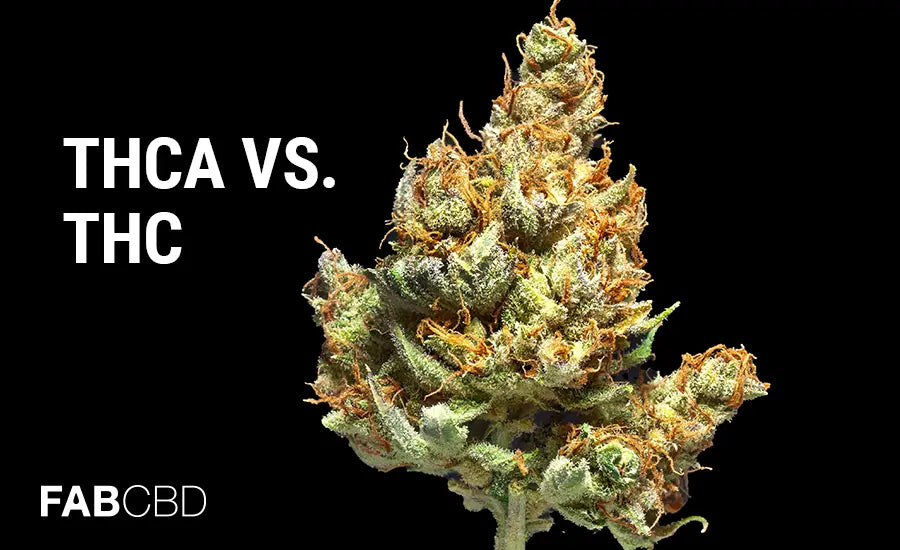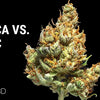All of us cannabis enthusiasts are familiar with THC, also known as tetrahydrocannabinol. This nifty compound not only has many potential wellness benefits, but it is also the psychoactive compound responsible for the “high” that recreational users seek.
However, did you know about THCA, otherwise known as tetrahydrocannabinolic acid? It also comes from the marijuana plant, and it is the non-intoxicating precursor to THC.
Some cannabis users are increasingly interested in THCA for its potential benefits without the high. But what exactly is THCA and how is it different from THC? Fret not! In this blog post, we’ll tell you all about it so you can make an informed choice as to what to use.
Understanding THCA and THC
So, what exactly is THCA and how is it different from our beloved THC?
THCA: The Precursor to THC
As mentioned earlier, THCA is an acidic form of THC found in raw cannabis plants that is non-psychoactive. It is a precursor to THC, the psychoactive compound we all know and love.
THCA converts into THC through a process called decarboxylation, which is when the cannabis flowers are exposed to heat or UV light. This can be done through various processes such as cooking, baking, vaping, or as we all know, smoking.
Without going through these processes, THCA remains non-psychoactive, but if it converts into THC, it will produce the high that is commonly associated with smoking cannabis.
THC: The Psychoactive Component
THC is one of the hundred or so cannabinoids that are found in the cannabis plant. It is the psychoactive compound that produces the high when cannabis is ingested or smoked.
THC interacts with your body’s endocannabinoid system (ECS) by binding to the CB1 and CB2 cannabinoid receptors in our brains. The ECS is an extremely complex network of receptors and neurotransmitters that play a crucial role in keeping our bodies in a state of balance called homeostasis.
Some of the ECS’ responsibilities include managing mood, appetite, memory, focus, and supporting the immune function. The human body naturally produces cannabinoids that interact with the CB1 and CB2 receptors, allowing the ECS to fill its role.
The CB1 receptors are mostly found in the brain and central nervous system, and the CB2 receptors are found in the organs and cells.
THC activates the CB1 receptors and can alter normal brain function, leading to psychoactive effects like euphoria, altered perception, and impaired cognitive functions. THC also interacts with the CB2 receptors and can potentially support conditions like inflammation.
The Conversion Process: Decarboxylation
As mentioned before, THCA converts into THC through exposure to heat or UV in a process called decarboxylation, which is essential if you want the intoxicating effects of THC.
The decarboxylation process involves removing a carboxyl group (COOH) from THCA molecules, resulting in releasing carbon dioxide and forming THC. The temperatures that THCA needs to be exposed to are about 105°C (221°F) to 120°C (248°F), with the process taking anywhere from 30 to 45 minutes to several hours, depending on the method and specific conditions.
Precise control of the temperature is vital: if it is too low, the process is incomplete but too high, and you’ll risk degrading the THC into non-psychoactive compounds.
You can also expose THCA to sunlight, but it will take a longer time and is less controlled than applying direct heat. Over-exposure to sunlight can also degrade THC and turn it into CBN (cannabinol), which is a cannabinoid with different and non-psychoactive effects.
THCA can be used in many ways but one of the most popular is turning it into extracted oil. Extraction must be done in a way that avoids decarboxylation, ensuring THCA remains in its acidic form.
You can extract THCA by using solvents, CO2 extraction, or cold-press processes. Once extracted, you can use the tinctures, concentrates or oil in numerous ways such as sublingually, which means placing it under your tongue, adding it to food or beverages, making gummies, and making topical cream.
Benefits and Effects
So why would you use THCA and what are the reported benefits?
Benefits of THCA
It is important to note that THCA is relatively new and ongoing research is still lacking. However, some preliminary studies suggest that THCA could have potential benefits for promoting relaxation and supporting stress management.
In addition, THCA has anti-inflammatory properties that could help with exercise related inflammation and ease discomfort. A study on mice also found that THCA has properties and could help support brain function.
Another study, also on mice, found that the effects of THCA could potentially alleviate exercise-induced inflammation and support healthy liver functions.
Effects of THC
Cannabis consumers that have smoked or ingested weed knows about the psychoactive properties of THC. Although the effects differ from one individual to the next, you generally feel relaxed, calmed, and euphoric, resulting in the high that recreational users chase.
You might also have altered perception and react differently to touch, sounds, colors, and taste. Memory, brain function, and decision making can also be impaired, and you might have difficulty concentrating or remembering things while under the influence of weed.
While some users might feel relaxed and calm, other users might feel anxious or uncomfortable. Another quirky (and adorable!) side effect of smoking or ingesting THC is the “munchies”, which is the urge to eat your favorite food excessively. THC is known to stimulate appetite and heighten your sense of taste, so you might be finishing that bag of chips sooner than you think.
THC also can impair your motor skills, so you’ll need to avoid driving or operating machinery. Because of all these side effects, many users choose THCA or other cannabinoids for their reported wellness benefits without the high associated with THC.
Legal and Safety Considerations
The line between THC and other cannabinoids as well as THCA is fairly distinct. While some states and countries have legalized THC for recreational or medical use, it remains a controlled substance in many others.
However, THCA and other cannabinoids are legal under federal law due to the 2018 Farm Bill, which allows all cannabis products with a THC content of under 0.03%. Such low THC levels is extremely unlikely to produce any kind of psychoactive effects.
Under the 2018 Farm Bill, common products like delta-8 THC, CBD, THCA, and other non-psychoactive products are legal if they are tested and contain less than 0.03% THC.
However, some states have implemented laws with tighter restrictions on cannabinoids, so it is important to be aware of your local laws and regulations.
If you are looking for such products, be sure only to buy from reputable manufacturers whose products have undergone third-party lab testing to ensure potency and purity. Untested or inferior products could be contaminated and contain more THC than advertised.
Conclusion
THCA is a precursor to THC and doesn’t have any psychoactive effects. It is also federally legal under the 2018 Farm Bill, unlike THC which is still illegal in many states. THC will also cause you to fail a drug test, but THCA contains such low levels of THC that you are unlikely to fail.
If you’re looking for marijuana products for health and wellness, be sure to understand the difference between THC and other non-psychoactive cannabinoids. Also, only buy from reputable sources whose products have undergone third-party lab testing to ensure purity and potency. Inferior products could contain higher levels of THC or other harmful additives and contaminants.
THCA vs THC FAQs
What is decarboxylation, and why is it important?
Decarboxylation is a process that converts THCA into THC through the application of heat or UV. This process is essential if you want to experience the psychoactive effects of cannabis when smoking, vaping, or ingesting edibles.
Can THCA get you high?
THCA is non-psychoactive and does not cause a high. It is only when it converts into THC through a process called decarboxylation does it become psychoactive.
What are the benefits of THCA?
The potential wellness effects of THCA include promoting calm and relaxation, helping manage everyday stress and anxiety, increasing appetite, and promoting healthy sleep.
How do THC and THCA differ in their effects on the body?
THC interacts with the brain’s receptors to produce psychoactive effects, and cause a “high”, which THCA is non-psychoactive and offers some wellness benefits like promoting calm and reducing day to day stress and anxiety.







